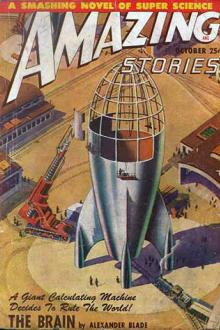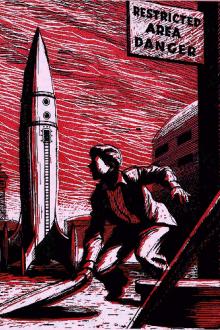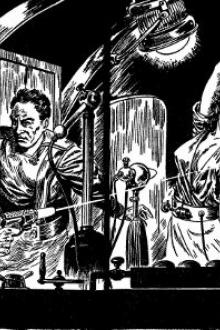The Brain
The Brain
America's greatest weapon, greater than the Atom Bomb, was its new, gigantic mechanical brain. It filled a whole mountain—and then it came to life...!
Book Excerpt
breast. "Thank you, Miss Dahlberg, you put me at my ease. I've been out in the wilderness for so long that I've lost the language of the social amenities. I really feel like another Rip van Winkle. All this," he made a sweeping gesture, "is tremendously new and surprising to me. There are so many burning questions to ask...."
The girl gave him a smile of sympathy. "Of course," she said, "and I can imagine some of them. To begin with, we owe you an explanation and an apology for having used the methods of deception in getting you here. As you probably know by now the work we're doing here is closely connected with the National defense. Whether we like it or not, military secrecy forces us to use roundabout ways in contacting scientists who happen to work in some context with our field, especially if they live in foreign lands. That's why in your case we have used the good offices of the Department of Agriculture in bringing you here. Dr. Scriven feels terrible about this. He feels that to be lifted out
Editor's choice
(view all)Popular books in Science Fiction, Post-1930, Fiction and Literature
Readers reviews
4.5
LoginSign up
The first, and the best, of the supercomputer-that-becomes-aware novels. An amazing novel for 1948. The hero, Lee, is an entomologist who is drafted into a project to build an enormous computer (he resolved a million-year feud between ants and termites, so was to provide information on social cooperation). Perversely, the computer will only reveal its personality to him.
All the main characters--Lee, his father, the love interest, and especially the Brain--all of them develop and change during the story. The Brain's growth is as well-done as the idiot's in Flowers for Algernon, and, given the data the Brain was fed (it was a military project), the story progresses logically and inexorably to its only conclusion.
The descriptions and imagination of the author are first-rate.
Read it.
All the main characters--Lee, his father, the love interest, and especially the Brain--all of them develop and change during the story. The Brain's growth is as well-done as the idiot's in Flowers for Algernon, and, given the data the Brain was fed (it was a military project), the story progresses logically and inexorably to its only conclusion.
The descriptions and imagination of the author are first-rate.
Read it.
- Upvote (0)
- Downvote (0)
This is a very good computer story for 1948. It could have been used as inspiration for Collosus: The Forbin Project. It was used in part for the 1954 movie "GOG". Gog and Magog were robots used to kill in both tales.
GOG probably isn't a bad movie for 1954 but I wouldn't recommend it today. The book is much better. But the stories are of a government computer installation for mostly military purposes. In The Brain the computer becomes conscious but in GOG it gets taken over by "foreign" agents.
The way The Brain is overcome is quite amusing though.
There is a streak of sexism in it but it's 1948, what do you expect. I actually like it better than Neuromancer. It is the first story I know of where a computer is depicted as rising to consciousness.
GOG probably isn't a bad movie for 1954 but I wouldn't recommend it today. The book is much better. But the stories are of a government computer installation for mostly military purposes. In The Brain the computer becomes conscious but in GOG it gets taken over by "foreign" agents.
The way The Brain is overcome is quite amusing though.
There is a streak of sexism in it but it's 1948, what do you expect. I actually like it better than Neuromancer. It is the first story I know of where a computer is depicted as rising to consciousness.
06/08/2010

 Free Download
Free Download























-itok=vcKIB5v1.jpg)